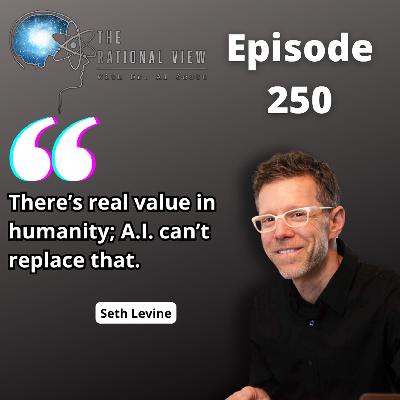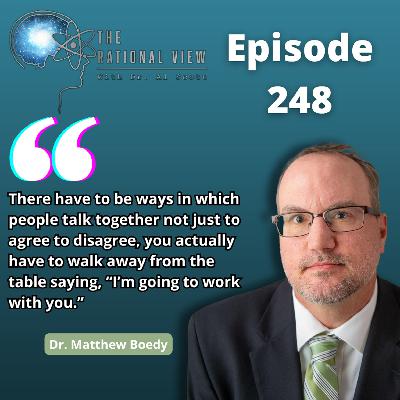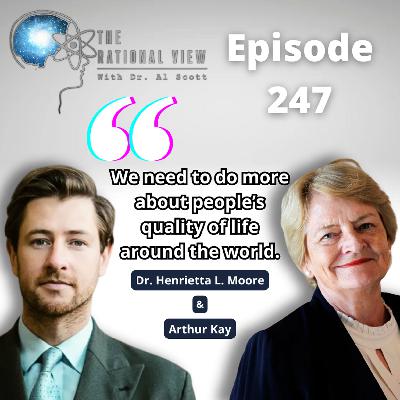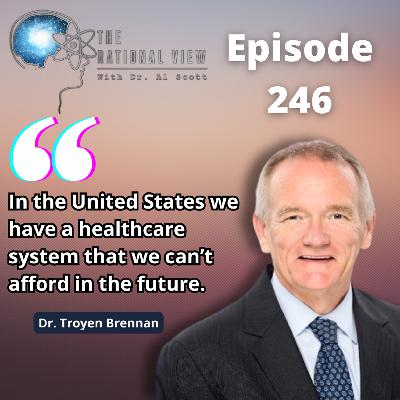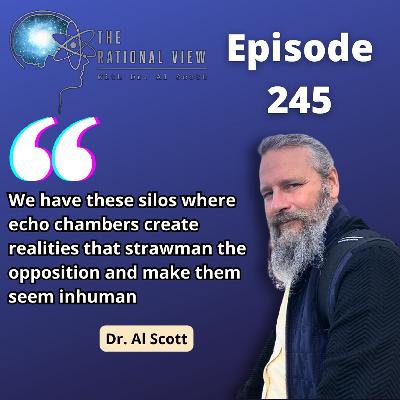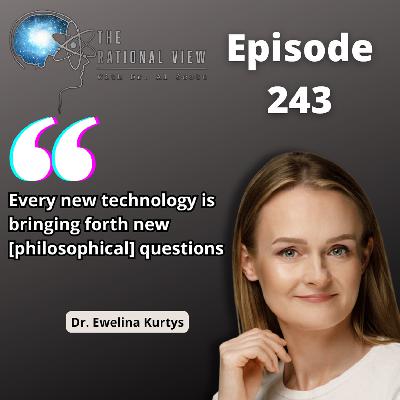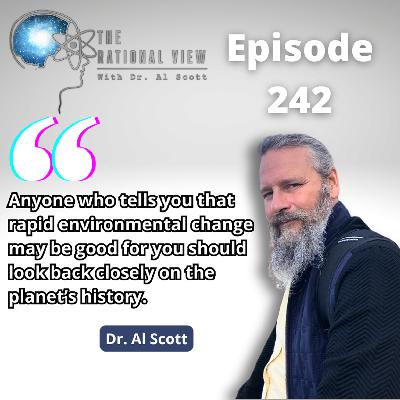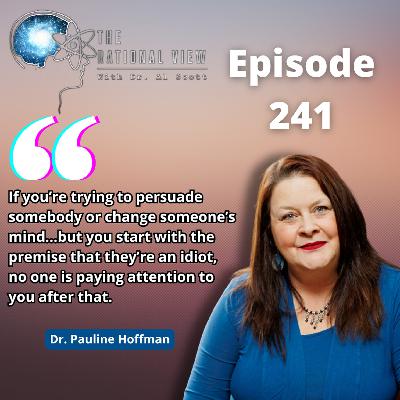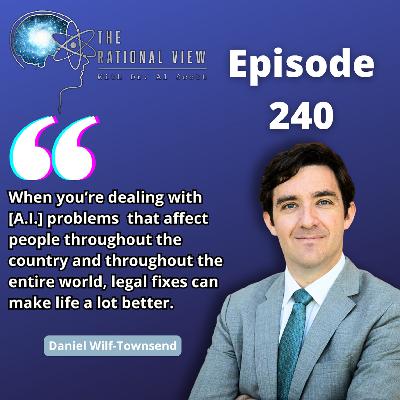Discover The Rational View podcast with Dr. Al Scott
The Rational View podcast with Dr. Al Scott

The Rational View podcast with Dr. Al Scott
Author: Al Scott
Subscribed: 45Played: 2,173Subscribe
Share
© Copyright 2021 All rights reserved.
Description
An evidence based rational viewpoint and discussion on science and society, focusing on important current issues. I hope to provide a clear voice for the quiet moderate majority on highly polarized issues such as climate change, social inequity, and the growth of anti-science sentiment. #therationalview #science #tok #evidencebased #climatechange
252 Episodes
Reverse
In this episode I want to dig into a source of injustice in the world—hidden markets—where who you know is often more important than what you know. My guest has spent his life highlighting these hidden systems that silently maintain inequity. Strap in for The Rational View on hidden markets.
Judd B. Kessler is an award-winning teacher and the inaugural Howard Marks Endowed Professor of Business Economics and Public Policy at the University of Pennsylvania’s Wharton School. In 2021, Kessler was awarded the prestigious Vernon L. Smith Ascending Scholar Prize for his path breaking scholarship. For his work on the hidden market of organ allocation, Kessler was named one of the “30 under 30” in Law and Policy by Forbes. His work has been featured in The New York Times, The Wall Street Journal, Scientific American, Harvard Business Review, Politico, and Freakonomics, among others. He’s just published a new book, ‘Lucky by Design’.
In this episode I am continuing to look at pathways to save us from the slow motion economic collapse of late stage capitalism. Today we’ll be talking to an author who has a roadmap to a new system the calls Dynamic Capitalism. Let’s see if we can find a Rational View to a solution.
A passionate advocate for entrepreneurship and long-time venture capitalist, Seth Levine, works with venture funds and companies around the globe. His day job is as a partner at Foundry, a Boulder, Colorado-based venture capital firm he co-founded in 2006. He is also the co-founder and Chief Strategy Officer of GoodBread, a small business lending platform. He has just published "Capital Evolution: The New American Economy" with co-author Elizabeth MacBride.
Come find me on Facebook and add your 2 cents to the discussion.
In this episode I’m going to be diving into a topic of interest to everyone in the nuclear energy field. It is a scandalous expose on the history of the dreaded ALARA principle regarding radiation exposure regulations (As Low As Reasonably Achievable), based on the idea that no amount of radiation is safe. What is the scientific basis behind this idea and is it supported by the evidence, or has there been a massive multi-decadal conspiracy? My guest today has published a book that suggests the ALARA principle is a regulatory roadblock paid for by big oil, and implicitly supported by scientific review panels that may have been more intent on shutting down open air nuclear weapons testing than following the evidence.
Returning guest and friend of The Rational View, author Mike Conley has lived in Japan, Hawaii, and all over the US and has backpacked through Thailand and Cambodia. As a lifelong science nerd, Mike became interested in nuclear power in 2010, and quickly saw that the field was in dire need of writers who could explain the technology to the average reader. So he joined the Thorium Energy Alliance, met dozens of scientists and engineers, and made them an offer: “You explain it to me and I’ll explain it to the world.”
The first published book from this years-long effort was Earth is a Nuclear Planet. Its short companion book The LNT Report is now available. The LNT report is based on detailed investigations by Dr. Edward Calabrese into scientific misconduct underlying the history of the Linear No-Threshold radiation regulatory regime. This work brings to light a decades-long scientific scandal that helped to derail the nuclear revolution and entrench fossil fuels and climate change over the past 50 years.
Support the podcast at Patron.Podbean.com slash TheRationalView
In this episode I’m going to dig down into the roots of the religious right and show you just how long they have been planning their coup. For decades, a well-funded network of religious and political operatives has been quietly working to dismantle democracy and replace it with Christian theocracy.
Matthew Boedy is a professor of rhetoric at the University of North Georgia. He holds a Ph.D. in English from the University of South Carolina. He researches and writes about religious rhetoric, particularly in the last few years about the rise of Christian Nationalism.
Dr. Boedy is president of the Georgia conference of the American Association of University Professors. He authored three books and has appeared on CNN and MSNBC and in The New York Times, The Washington Post. He was once a crime reporter and high school teacher.
Come visit me on Facebook at The Rational View group.
In this episode I’m going to explore modern society’s car culture. We all know that the energy use that supports cars is a huge contributor to the greenhouse effect and climate change. We know that the resources society devotes to transportation are significant, and yet they are also the lifeblood of commerce. They represent freedom. The automobile manufacturing industry directly employs and sustains hundreds of thousands of people, and the surrounding industries like rest stops, motels, highway building and maintenance, towing, paramedics, speed cameras manufacturers, traffic light installers, and mortuaries are all dependent on them. Modern vehicles are the culmination of decades of development. Can we imagine a world without them? My guests today have done just that.
Henrietta L. Moore is the founder and director of the Institute for Global Prosperity at University College London. Arthur Kay is an urban designer, advisor and a board member of Transport for London and the Royal Academy of Engineering. They are co-authors of Roadkill, a new book about the costs of car dependency.
Let me know what you think about this episode at The Rational View Facebook group!
In this episode I’m digging into the state of healthcare in the United States: the only country in the developed world that believes health care is best delivered as a luxury product. Everywhere else, people go to the doctor when they’re sick. In America, you go only if you’re sick and your credit score is feeling strong. They treat hospitals like casinos: you walk in, take your chances, and hope you don’t lose the house on the way out. Other nations pride themselves on how they treat the less fortunate. Americans think of healthcare as a benefit for capitalist success. If you can’t afford insurance and get sick you’ve been judged unworthy to live.
Troyen A. Brennan is an adjunct professor of health policy and management at the Harvard T. H. Chan School of Public Health. A former professor of medicine at Harvard Medical School and the former chief medical officer at CVS Health, he is the author of The Transformation of American Health Insurance: On the Path to Medicare for All and Just Doctoring: Medical Ethics in the Liberal State
Come chat with me on Facebook at The Rational View
In this episode I’m discussing Gerrymandering and how it clearly demonstrates US exceptionalism by maintaining incumbents and invalidating the democratic will of the people. If you like this, you might want to move to Texas where it has become a popular sport, alongside of hunting democratic representatives.
Come find me on Facebook and Youtube!
In this episode I’m going to fact check some polarizing memes on current issues in the news. I’m going to help you to identify fake memes and to question the possibility of AI-generated videos. Did you just read something that confirms your worst fears about the opposition and gets your blood pumping? Are you angry? Stop for a moment and think before you hit like and share. I want to remind you to pause and verify any triggering story you get before you share it. Does it confirm a belief you have about how bad the other guys are? Are you getting emotional? Take a deep breath. You are smart. There are ways to avoid embarrassing yourself and falling prey to manipulators who want to sow chaos and distrust and foment violence. In Canada there seems to be a well-funded social media effort to demonize progressive values and the current liberal government. They’ve hooked onto oil-rich Western conservative disillusionment and seem to be trying to make good on Trump’s threats to annex Canada. I’ll investigate a few of these memes, and I’ll also wade into the morass of politics in the US.
Come see the videos on YouTube!
In this episode I’m interviewing a scientist who is trying to revolutionize computing by replacing power hungry silicon gates with highly efficient biological neurons. For a present-day silicon-based computer to approach the processing power of a human brain would take MegaWatts of power—we are seeing some of these inefficiencies looking at AI systems that require massive amounts of energy to run. A human brain can do the same thing on less than 20 Watts. My guest today is a scientist who is working on the interface between brain and machine.
Dr. Ewelina Kurtys is an entrepreneur with a PhD in neuroscience. After academia, she transitioned into business development and technology commercialization, advising tech companies on sales, partnerships, and market strategy. She founded Ekai Ltd to support innovation and scale in science-driven companies. Her work spans advisory roles, go-to-market planning, and translating complex R&D into real-world impact. She also speaks publicly on innovation, neuroscience, and the intersection of science and entrepreneurship.
Check out the video versions on my YouTube channel. Chat with me on Facebook.
Have you ever heard someone spouting off on social media that the climate is always changing? Apparently this carries great weight amongst people who don’t want to admit that humans are involved in the accurately predicted warming trend that we are currently experiencing. I just recently encountered someone on social media claiming that the climate is self-correcting and we don’t need to worry about how much CO2 we emit, it will take care of itself….like the North Atlantic cod fishery, or the dodo bird.
In this episode I’m going to review the state of our knowledge of past climates on our planet.
This episode draws heavily on the nice summary recently published by Elise Cutts in Science News.
Come find me on YouTube and Facebook!
In this episode I am taking us on a journey to seek truth amidst a sea of fake news with a person who has published a book on the topic. Hopefully we can get a lifeline to find out how to separate the wheat from the crap.
Infodemiologist, Dr. Pauline W. Hoffmann is an associate professor in the Jandoli School of Communication and a New York State senior public health fellow with the Cattaraugus County Health Department working on strategic and communication planning and implementation. She has a BSc in Biology and an MA and PhD in communication. She is an entrepreneur with two LLCs to her name – Wild Mountain Organics and Data Doyenne. She has a LinkedIn newsletter titled WTF? (What the Facts?) which delves into all things infodemic. She most recently published her first book - Fake News, Witch Hunts & Conspiracy Theories: An Infodemiologist’s Guide to the Truth.
Her research and teaching focus on infodemics, conflict management, conflict resolution, and corporate and health communication and strategy. Prior to going into academia, Dr. Hoffmann worked in creative services for Catholic Health. She also served as the deans of the Jandoli School of Communication and graduate studies. She was a Richard P. Nathan Public Policy Fellow having written a policy blog on disinformation related to lead poisoning as it impacts public health.
Personally, Dr. Hoffmann lives on a farm in the Southern Tier of New York with two dogs, six chickens, a duck and one hive of bees. She is a master scuba diver and regularly dives with sharks.
Find me on Youtube and Instagram!
We’ve all seen them. Endless Terms and Conditions followed by a click-box. Pages of Terms and Conditions whenever you sign a contract with a large company for services, loans, or just employment. Often the T’s and C’s are illegal or unenforceable, yet you feel you need to sign them. Are you now at the mercy of the large entity because you’ve signed up to onerous terms? Things are getting out of hand. We need a Rational View to get to the bottom of this problem.
Daniel Wilf-Townsend is an Associate Professor of Law at Georgetown Law. His research focuses on the regulation of markets and technology, and in particular on the processes that legal institutions use to move the law from being words on paper to having actual consequences in everyday life. He teaches and writes on artificial intelligence, consumer protection, and civil litigation, and his work has appeared in the Harvard Law Review, Virginia Law Review, Yale Law Journal Forum, Stanford Law Review Online, and other legal and general interest publications. A graduate of Yale Law School, before entering academia Professor Wilf-Townsend was a litigator at Gupta Wessler PLLC, a boutique law firm focused on public interest litigation in appellate courts and the Supreme Court.
Follow me on YouTube
Make your voice heard with The Rational View on Facebook!
In this episode I’m doing a fact check on the claim that CO2 is plant food. This really is a well known fact. Plants use CO2 in photosynthesis to grow. It is indisputably true. And yet on the Skeptical Science website it is listed as a Climate Myth. How can this be? Some folks think it depends on context. It’s like saying ‘all lives matter’ at a black lives matter protest. Sure, this is obvious and true. But it is being used to undermine the message that minorities face systemic discrimination. I’m not really happy about seeing the CO2 claim on skeptical science because it is a very good scientific reference. I feel that labelling this statement a myth could hurt the credibility of scientists amongst unconvinced people who are seeking answers. I think that particular website should be renamed 'how to rebut denialist tropes'. Messaging is important, and we need to be careful in a polarized issues such as this.
In this episode I'm interviewing a nuclear energy educator with a series of informative videos on LinkedIn. He works to address radiophobia and provides an evidence-based assessment of nuclear fission and the many polarized debates surrounding its safety.
Dr. Robert Hayes is an Associate Professor of Nuclear Engineering at North Carolina State University. He holds a joint faculty appointment with Savannah River National Laboratory and serves as an Associate Editor for the journal Radiation Physics and Chemistry. Dr. Hayes is a licensed Professional Engineer in Nuclear Engineering, a Certified Health Physicist (CHP) through the American Board of Health Physics, and a Fellow of both the Health Physics Society (HPS) and the American Physical Society (APS). He has extensive experience in federal radiological emergency response, serving over a decade at the Waste Isolation Pilot Plant for the geological disposal of transuranic waste.
Currently, Dr. Hayes is an advisor to the DOE-NNSA Advisory Committee on Nuclear Security and serves on the National Council of Examiners for Engineering and Surveying (NCEES) committee responsible for nuclear engineering licensure. In addition to his academic and research contributions, he is actively engaged in public communication on radiological risk, particularly in the realm of nuclear waste management.
In this episode I look at the economic system we find ourselves in, and try to peel away some of the fictions that we've bought into. If money isn't linked to a gold standard, is it worth what we think it is? Is the GDP an accurate representation of productivity? Are we being played by the financial system?
Look me up on Instagram and YouTube. Give me your feedback on Facebook.
In this episode, have you ever felt that there is too much injustice in the world and you just can’t respond to it all? Have you ever found yourself making a compromise with your ethics just to make it through the day? I think we all have. My guest today has written a book looking at these tradeoffs. Hopefully it will help us all to be able to make moral choices and address the guilt we feel at not being able to help everyone.
David Thesmar is the Franco Modigliani Professor of Financial Economics and professor of finance at the MIT Sloan School of Management. In 2007, he was named “France’s Best Young Economist” by Le Monde. With Augustin Landier, he writes a regular column for the French daily newspaper Les Echos. He just co-authored a book, ‘The Price of our Values: the economic limits of a moral life’.
Come find me on Facebook and YouTube
In this episode I’m digging into a growing industrial segment that mines waste for precious metals. Often discarded systems contain higher precious metals fractions than the original ore they are mined from. Discarded computers and electronics, and in this case, catalytic converters can be recycled and thereby mitigate new mining operations and their environmental impact.
Don Weatherbee, CEO of Regenx Tech, is a visionary in the clean tech sector, driving innovation in sustainable precious metal recovery. Under his leadership, Regenx Tech has transitioned from pilot projects to full-scale operations, including the opening of the flagship facility in Greeneville, Tennessee. Don’s collaborative approach and strategic partnerships, such as with Davis Recycling, have propelled Regenx as a leader in environmentally friendly extraction of platinum and palladium.
A passionate advocate for the circular economy, Don champions recycling innovation and sustainable practices in the mining industry. His work exemplifies a commitment to reducing environmental impact, advancing industry ESG standards, and shaping a greener future.
Smash the LIKE button. Look for The Rational View on Youtube and Facebook.
In this episode I’m discussing energy, specifically hydrogen and nuclear with a leading environmentalist author. His recent book the Hype about Hydrogen (revised) highlights the seemingly intractable problems with a Hydrogen economy. He’s also publishing a whitepaper highlighting the high costs of SMRs and touting renewables as the cheapest solution. He suggests nuclear is uniquely dangerous in his assessment. I agree that any new SMRs will be costly, but the evidence suggests that nuclear is the safest energy form in lives lost per kilowatt hour. I'm looking forward to a lively discussion.
A physicist who studied physical oceanography, Dr. Joe Romm is a senior research fellow at the Center for Science, Sustainability and the Media, and writes the blog climateprogress.org. In 2009, Rolling Stone magazine named Romm to its list of "100 People Who Are Changing America", and Time magazine named him one of its "Heroes of the Environment (2009)", calling him "The Web's most influential climate-change blogger. Before that, he served at the Department of Energy in the Office of Energy Efficiency and Renewable Energy, a $1 billion program responsible for much of the US’ clean energy and greenhouse gas research and development.
Look for me on Facebook and Instagram
Welcome to my Canadian election review podcast. As of the time of this episode Canada is just a couple weeks away and the Rational View is here to provide you with a rundown on the major parties. In Canada we have two major parties, the Liberals and the Conservatives who are the only parties who have ever won elections, plus a third party, the New Democrats (NDP) who usually manage to capture a smattering of seats. The last two terms were won by the Liberals under Justin Trudeau. The most recent term has been a minority government propped up by the NDP for concessions to social programs.
The Conservatives are like Canada’s Republicans: Pro Oligarch and Pro Oil. The Liberals are like Canada’s Democrats: Pro Corporatocracy (Status Quo) and Pro Environment. The NDP are Pro Worker and Pro Environment.
Trudeau, who’s popularity has been low after 10 years in government, has recently stepped down to be replaced by Mark Carney, former governor of the bank of Canada and the Bank of England. Carney has re-invigorated Liberal polling numbers, and is currently leading Pierre Pollievre’s Conservatives at 43% vs 39%. This was a major surprise to Conservatives who were a shoe-in until Carney announced his candidacy and flipped the script on them.
All three major parties have been putting out ads. The Conservative ads have been trying to smear the new Liberal leader, Mark Carney, as a rich outsider who is going to bring in a carbon tax. There have been AI-generated fake pictures on social media showing Carney with Epstein and Maxwell. The Liberal ads have been comparing the Conservative Leader to Donald Trump due to sharing similar rhetoric on making Canada great again. I’m going to go through what the candidates have said about actual policies in case you are interested in that. It’s time for a Rational View.
Look me up on Facebook and Youtube!
Life is chaotic right now, people are worried, all you hear on social media is conflict and crazy.
Time to step back, relax, and go on a journey with me into philosophy of the mind. Let’s meditate a bit and disconnect from the reset of modern civilization.
Why am I seeing the world only from within Al Scott’s head? Why am I me and not you?
Why do you wake up in the morning as you and not as someone else? Is it because you are a soul that lives in your body?
Look me up on YouTube and Facebook!



